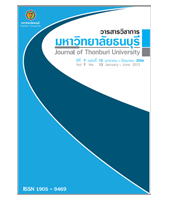การบัญชีทรัพยากรมนุษย์ : เครื่องมือที่ใช้วัดประเมินศักยภาพการลงทุนมนุษย์เพื่อประโยชน์ขององค์การ
Keywords:
ทุนมนุษย์, ทรัพยากรมนุษย์, การบัญชีทรัพยากรมนุษย์, Human Capital, Human Resource, Human Resource AccountingAbstract
ความรู้และทักษะของมนุษย์ หรือ “ทุนมนุษย์” นับเป็นปัจจัยสำคัญอย่างยิ่งต่อการสร้างประสิทธิภาพ ของงาน เนื่องจากความรู้ ทักษะ และความสามารถของมนุษย์เป็นสิ่งที่ก่อให้เกิดคุณค่างาน ผลผลิต และความสามารถในการแข่งขันขององค์การ ดังนั้น มูลค่าของคนนอกจากจะวัดการประเมินออกมาในรูปของผลการปฏิบัติงานแล้ว ในทางการบัญชียังสามารถประเมินมูลค่าคนออกมาเป็นตัวเลขและบันทึกบัญชีด้วยการคำนวณหาต้นทุนและผลตอบแทนจากการลงทุนในทรัพยากรมนุษย์ที่เรียกว่า “การบัญชีทรัพยากรมนุษย์” เพื่อประโยชน์ต่อการวางแผนการบริหารองค์การและเพิ่มศักยภาพด้านการพัฒนาทรัพยากรมนุษย์เพื่อให้สามารถแข่งขันภายใต้สภาพแวดล้อมที่เปลี่ยนแปลงอย่างรวดเร็วและต่อเนื่อง สามารถบริหารประโยชน์จากข้อมูลทรัพยากรมนุษย์เพื่อการตัดสินใจลงทุนและสร้างความเติบโตขององค์การได้อย่างเป็นระบบต่อไป
HUMAN RESOURCE ACCOUNTING: A POTENTIAL OF HUMAN CAPITAL EVALUATION MEASUREMENT TOOL FOR ORGANIZATION BENEFIT
Significantly, knowledge and proficiency skill of human resource or “Human Capital” are the most important factors for the efficiency of the performance. Due to knowledge skill and ability of human resource create valuable performance, productivity and competitive advantage of the organization. Therefore, the value of human resource in addition to measure evaluation in the form of performance in accounting aspect it also evaluated to value of human resource in the form of member and record the account with the cost evaluation and return on investment in human resource that called “Accounting Human Capital” for organization planning benefit and increased the potential of human resource development for the competitiveness in rapidly and continuing changing environment, manage the benefit from human resource information for investment decision making and create organizational growth systematically.







